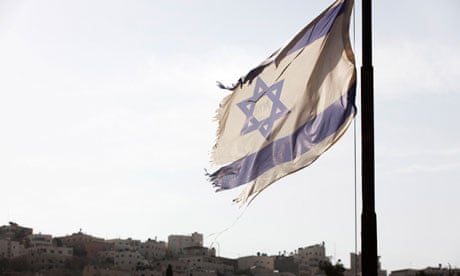The Church of Scotland has moved to defuse a furious row with Jewish leaders and the Israeli government after agreeing to change a controversial report on Israeli settlements.
Senior figures in the church met Jewish leaders on Thursday after an official report entitled the Inheritance of Abraham?. suggested the church consider political action including boycotts and disinvestment in Israel in protest at illegal settlements in the occupied territories.
The church and society council, which is to present its report to this year's meeting of the Church of Scotland's governing body, the general assembly, later this month, has agreed to reword the paper's introduction to make clear the church has never challenged the right of Israel to exist.
The original report, which will be debated and then voted on by 723 general assembly commissioners, or delegates from across Scotland, has also been taken down from the Church of Scotland's website until it is rewritten.
The concession emerged after Daniel Taub, the Israeli ambassador to the UK, accused the church of perpetuating anti-Semitic views by challenging the basis of Jewish ties and belief in Israel, and distorting the basis of Zionism.
"This report not only plays into extremist political positions, but negates and belittles the deeply held Jewish attachment to the land of Israel in a way which is truly hurtful," Taub said.
"If a document of this nature is adopted by the Church of Scotland it would mark a significant step backwards for the forces of tolerance and peace in our region."
The Anti-defamation League in New York said the paper was "stunningly offensive" and "negated the beliefs of Judaism", while one columnist in the Jerusalem Post, Seth Frantzman, described it as a "vicious and defamatory text."
The newspaper said the report was distorting arguments about the Holocaust by "pretending Jews manipulate the Holocaust in order to make Christians feel guilty."
The original version of the 10-page report began by questioning the "widespread assumption" that the Bible supports a Jewish state because that "raises an increasing number of difficulties and current Israeli policies regarding the Palestinians have sharpened this questioning".
It asked whether "the Jewish people today [would] have a fairer claim to the land if they dealt justly with the Palestinians?" and suggests some Jews believe they have a right to the land of Israel "as compensation for the suffering of the Holocaust".
It concludes: "From this examination of the various views in the Bible about the relation of land to the people of God, it can be concluded that Christians should not be supporting any claims by Jewish or any other people to an exclusive or even privileged divine right to possess particular territory.
"It is a misuse of the Bible to use it as a topographic guide to settle contemporary conflicts over land."
A church spokesman insisted the paper was designed to highlight the injustices suffered by Palestinians and the disparities in land use; they were obstacles to peace, he said, but had no scriptural justification.
In a joint statement with the Scottish Council of Jewish Communities, the Board of Deputies of British Jews, the Movement for Reform Judaism and Rabbis for Human Rights, the church and society committee agreed the report needed to be "explicit" about its belief that Israel had a right to exist.
It added that they condemned all violence and terrorism, and "all things that create a culture of anti-Semitism".
But the committee added, however: "The concern of the church about injustices faced by the Palestinian people in the occupied Palestinian territories remain firm but that concerns should not be misunderstood as questioning the right of the State of Israel to exist.
"Sitting round the table and listening to each other more deeply has created a real opportunity for both communities to better understand each other and this report now becomes a catalyst for continued and growing conversation."
